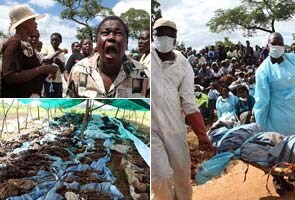
Harare:
A court has ordered militant supporters of President Robert Mugabe to stop exhuming hundreds of skeletons they say were the victims of colonial-era massacres, a project that critics say is stoking racial hatred in Zimbabwe.
The High Court in Bulawayo ruled that the group must immediately cease digging out human remains from a disused mine shaft where officials have bused schoolchildren to view the remains as militants denounced whites and sang revolutionary songs.
Thursday's ruling by Judge Nicholas Mathonsi says some surviving former guerrillas from the independence war had demanded a halt to exhumations that were not being carried out by experts. Government ministers in charge of police and security must enforce the order, he said.
The judge said the exhumations violated all international protocols on investigating suspected human rights violations and amounted to "interference or tampering with crime scenes."
Mugabe's loyalists say the mass graves show how the country's former rulers were guilty of human rights violations far outweighing any accusations leveled against Mugabe's supporters. But some corpses still had hair, skin and body fluids, raising doubts over dates of the killings in a nation long plagued by violence.
A group of ex-guerrillas from western Zimbabwe protested to the court that the exhumations near the provincial center of Mount Darwin, 160 kilometers (110 miles) from Harare, were "chaotic and nonscientific" and testified some of their fellow fighters died in the district fighting colonial-era troops.
Mugabe, who has been in power since the country's 1980 independence from Britain, was forced to enter a power-sharing agreement with the longtime opposition after disputed, violence-married elections in 2008. But Mugabe has called for elections this year to bring to an end to the shaky two-year coalition brokered by regional leaders.
Seen as a macabre thrust to election campaigning, Zimbabwe's sole broadcaster controlled by Mugabe loyalists has urged ordinary citizens to visit the disused Chibondo gold mine to witness the horror of colonial atrocities.
Reporters taken to the site on a trip organized by Mugabe's Ministry of Information said school children were bused there. Militants sang revolutionary songs, shouted slogans and denounced whites and Prime Minister Morgan Tsvangirai's pro-Western party for its links with Britain, the former colonial power.
Bones and remains lay in random heaps, some covered by sheets and blankets. Hair and clothes were clearly visible; the mine shaft emitted an overwhelming stench.
The prime minister's party has criticized the exhumations for stoking hatred at a time the nation still suffers the effects of political violence. After independence an estimated 20,000 civilians were killed by Mugabe's soldiers when they crushed an armed uprising in the western Matabeleland province.
In what lawyers say is a landmark ruling that could open up Zimbabwe's violent secrets, Judge Mathonsi has directed officials to start a formal "legal process and framework" for investigating deaths and disappearances both before and after Zimbabwe's independence.
The High Court in Bulawayo ruled that the group must immediately cease digging out human remains from a disused mine shaft where officials have bused schoolchildren to view the remains as militants denounced whites and sang revolutionary songs.
Thursday's ruling by Judge Nicholas Mathonsi says some surviving former guerrillas from the independence war had demanded a halt to exhumations that were not being carried out by experts. Government ministers in charge of police and security must enforce the order, he said.
The judge said the exhumations violated all international protocols on investigating suspected human rights violations and amounted to "interference or tampering with crime scenes."
Mugabe's loyalists say the mass graves show how the country's former rulers were guilty of human rights violations far outweighing any accusations leveled against Mugabe's supporters. But some corpses still had hair, skin and body fluids, raising doubts over dates of the killings in a nation long plagued by violence.
A group of ex-guerrillas from western Zimbabwe protested to the court that the exhumations near the provincial center of Mount Darwin, 160 kilometers (110 miles) from Harare, were "chaotic and nonscientific" and testified some of their fellow fighters died in the district fighting colonial-era troops.
Mugabe, who has been in power since the country's 1980 independence from Britain, was forced to enter a power-sharing agreement with the longtime opposition after disputed, violence-married elections in 2008. But Mugabe has called for elections this year to bring to an end to the shaky two-year coalition brokered by regional leaders.
Seen as a macabre thrust to election campaigning, Zimbabwe's sole broadcaster controlled by Mugabe loyalists has urged ordinary citizens to visit the disused Chibondo gold mine to witness the horror of colonial atrocities.
Reporters taken to the site on a trip organized by Mugabe's Ministry of Information said school children were bused there. Militants sang revolutionary songs, shouted slogans and denounced whites and Prime Minister Morgan Tsvangirai's pro-Western party for its links with Britain, the former colonial power.
Bones and remains lay in random heaps, some covered by sheets and blankets. Hair and clothes were clearly visible; the mine shaft emitted an overwhelming stench.
The prime minister's party has criticized the exhumations for stoking hatred at a time the nation still suffers the effects of political violence. After independence an estimated 20,000 civilians were killed by Mugabe's soldiers when they crushed an armed uprising in the western Matabeleland province.
In what lawyers say is a landmark ruling that could open up Zimbabwe's violent secrets, Judge Mathonsi has directed officials to start a formal "legal process and framework" for investigating deaths and disappearances both before and after Zimbabwe's independence.
Track Latest News Live on NDTV.com and get news updates from India and around the world

